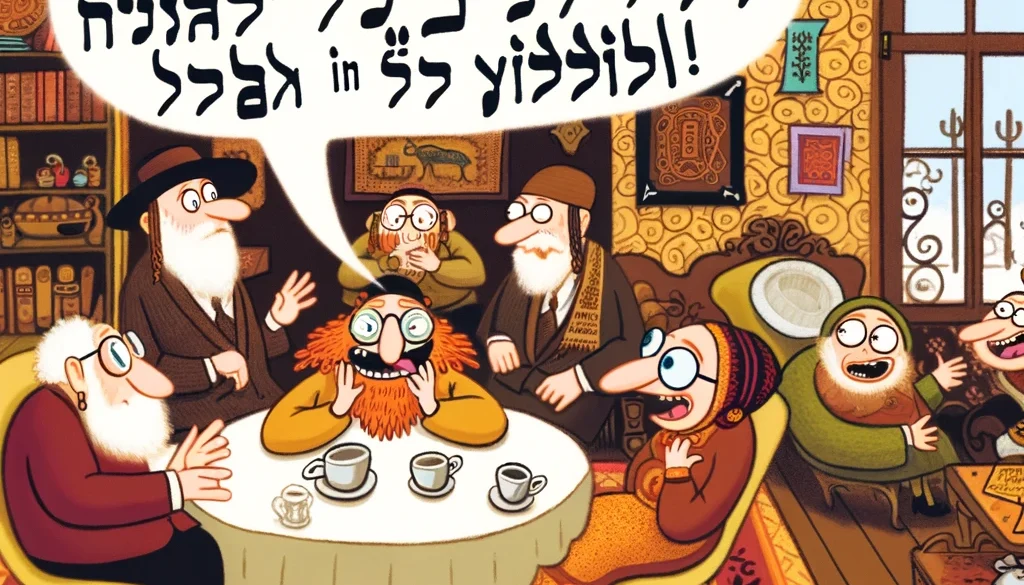The Most Important 18 Yiddish Words Everyone Needs to Know
18 Yiddish Words to Know
Yiddish, a language that weaves together Hebrew, German, Slavic languages, and a sprinkle of linguistic magic, has a rich history and an even richer vocabulary. It’s a language of depth, humor, and emotion, often encapsulating concepts that English can only grasp at with a handful of words. The saying goes, “If you have nothing nice to say, say it in Yiddish”—perhaps because even complaints sound better in this delightfully expressive language! Here are 18 Yiddish words that are not only important but will also add a sprinkle of humor, wisdom, and cultural flair to your vocabulary.
1. Schlep
To carry something heavy or cumbersome, but also used to describe a long and possibly tedious journey.
In a sentence: “I had to schlep my groceries up five flights of stairs because the elevator was broken.”
2. Kvetch
To complain persistently or whine about something, kvetching is practically a sport in Yiddish-speaking communities.
In a sentence: “He could kvetch about anything, even on a sunny day.”
3. Chutzpah
Chutzpah is audacity or nerve, often used to describe someone who’s boldly stepping out of line but might be admired for their gutsiness.
In a sentence: “Asking for a raise on your first day is quite the chutzpah.”
4. Mazel Tov
A phrase used to express congratulations or good luck. It’s probably one of the most widely recognized Yiddish expressions.
In a sentence: “Mazel tov on your engagement! When’s the wedding?”
5. Nosh
To snack or eat between meals. Noshing is a beloved pastime, reflecting the joy of eating for its own sake.
In a sentence: “I could really go for something to nosh on during the movie.”
6. Schmooze
To chat or network in a cozy, friendly manner, often with an underlying motive of gaining some advantage.
In a sentence: “He’s great at schmoozing with clients, always leaving a good impression.”
7. Bubbe
A term of endearment for a grandmother, reflecting the warmth and love associated with grandmothers in Jewish families.
In a sentence: “My bubbe makes the best matzo ball soup in the world.”
8. Zayde
The male counterpart to bubbe, zayde is a term of endearment for a grandfather.
In a sentence: “Zayde used to tell me stories of his childhood in the old country.”
9. Kibitz
To offer unsolicited advice or comments, often in a nosy or overly involved manner, but it can also refer to light-hearted chatting.
In a sentence: “Stop kibitzing and let me figure this out on my own!”
10. Meshuga
Crazy or senseless, often used to describe someone’s behavior or idea that’s beyond comprehension.
In a sentence: “You want to go jogging in this blizzard? Are you meshuga?”
11. Schvitz
To sweat, especially profusely, whether from physical exertion or the heat of a sauna.
In a sentence: “I schvitz like crazy every time I go to the gym.”
12. Klutz
A clumsy person or someone who’s prone to accidents. Affectionately used, despite its somewhat teasing nature.
In a sentence: “I’m such a klutz—I tripped over my own feet and spilled coffee everywhere.”
13. Schmutz
A little bit of dirt, grime, or filth. Often used when pointing out a smudge on someone’s face or clothing.
In a sentence: “You’ve got a bit of schmutz on your cheek there.”
14. Shtick
A person’s special talent, gimmick, or humorous routine. Shtick makes you unique or entertaining in a social context.
In a sentence: “His shtick at parties is doing spot-on celebrity impressions.”
15. Oy Vey
An exclamation of dismay, frustration, or exasperation, akin to saying “oh woe!”
In a sentence: “Oy vey, I left my keys in the car again.”
16. Kvell
To swell with pride or gloat, particularly over someone’s achievements, often used in relation to family members.
In a sentence: “My parents kvell over my brother’s accomplishments as if he’s the first to ever graduate college.”
17. Shalom
A greeting that means peace, used for both hello and goodbye. It’s a wish for peace to the person you’re speaking with.
**In a sentence:** “Shalom, my friend! How have you been since we last met?”
18. Tchotchke
A small trinket or knick-knack, often without much practical use but kept for sentimental value or decoration.
In a sentence: “Every time she travels, she brings back a tchotchke for her collection.”
Yiddish is more than just a language; it’s a cultural tapestry rich with history, humor, and heart. These 18 words barely scratch the surface but offer a glimpse into the expressive depth and playful spirit of Yiddish. Whether you’re schlepping to a bubbe’s house, kvetching about the weather, or schmoozing at a social gathering, slipping in a Yiddish word or two not only enriches the conversation but also keeps this vibrant language alive and kicking. So next time you find yourself at a loss for words, remember: there’s probably a Yiddish word for that, and it’s bound to be more colorful, more expressive, and possibly even more humorous. After all, in a world full of languages, Yiddish truly knows how to stand out, offering warmth, wisdom, and a wonderful way to say, “If you have nothing nice to say, at least say it with a little Yiddish flair.”
Link to dictionary

